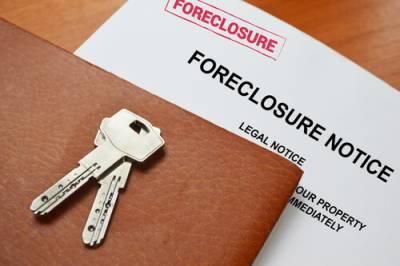1512 Artaius Parkway, Suite 300,
Libertyville, IL 60048
Call for a FREE Phone Consultation
847-549-0000
Video Consultations Also Available
 Spanish
Spanish Cantonese
CantoneseServing Clients Across 7 Illinois Locations
Recent Blog Posts
What Is a Strategic Default?
 When a homeowner is at risk of foreclosure, there are a number of ways that they can potentially respond. If their finances are solid but repayment could be made more manageable via a loan modification, this adjustment could mitigate the issues that led to missed payments in the past. Other homeowners file for bankruptcy to catch up on missed payments or pursue short sales to avoid foreclosure when they can no longer afford to remain in possession of their property.
When a homeowner is at risk of foreclosure, there are a number of ways that they can potentially respond. If their finances are solid but repayment could be made more manageable via a loan modification, this adjustment could mitigate the issues that led to missed payments in the past. Other homeowners file for bankruptcy to catch up on missed payments or pursue short sales to avoid foreclosure when they can no longer afford to remain in possession of their property.
Under a very specific set of circumstances, there is one additional opportunity that makes sense for some individuals who can no longer afford to remain homeowners. This opportunity is referred to as strategic default. It involves intentionally halting payments on a mortgage tied to a home that is worth significantly less than what the homeowner owes their lender.
Important Considerations
One of the reasons it is critical to seek professional guidance before engaging in a strategic default is that the consequences of this action are significant. While committing to a short sale will affect a homeowner’s credit score for a time, a strategic default will affect it significantly because this opportunity serves as an abdication of responsibility for the mortgage debt.
Short Sales: Answers to Frequently Asked Questions
 If you are a homeowner who is facing a genuine risk of foreclosure, you may have heard that conducting a “short sale” could serve as a viable way to resolve your circumstances. When circumstances are dire, it can be tempting to jump at any suggestion that could land you back on your feet. However, it is important to understand what you are getting into before committing to a short sale.
If you are a homeowner who is facing a genuine risk of foreclosure, you may have heard that conducting a “short sale” could serve as a viable way to resolve your circumstances. When circumstances are dire, it can be tempting to jump at any suggestion that could land you back on your feet. However, it is important to understand what you are getting into before committing to a short sale.
Our firm offers free consultations to anyone who is facing foreclosure and could benefit from a confidential, no-cost case assessment. Before you attend your session, consider looking over answers to some of the most frequently asked questions that we field from distressed homeowners who are seeking solutions. Making this effort can help you to become more familiar with one of the primary ways to resolve an impending foreclosure.
What Is a Short Sale?
“Short sale” is a real estate term that involves offering to sell a home for less than what an owner owes on their mortgage.
What Are The Costs Involved in Selling a Home?
 While most people know that buying a home is an expensive process, few people realize that selling a home comes with its fair share of expenses as well - especially if they are doing it for the first time. Not anticipating the true expense of selling a home can lead to unpleasant surprises at best, with many people suddenly realizing that they have put themselves in a desperate financial situation.
While most people know that buying a home is an expensive process, few people realize that selling a home comes with its fair share of expenses as well - especially if they are doing it for the first time. Not anticipating the true expense of selling a home can lead to unpleasant surprises at best, with many people suddenly realizing that they have put themselves in a desperate financial situation.
If you are considering selling your home, an Illinois residential real estate lawyer can help you plan carefully and avoid situations where you are responding to unexpected expenses or having to make last-minute accommodations. To learn more about what you should anticipate paying for when you sell your home, read on and then contact Newland & Newland, LLP for help.
What Do I Need to Pay For When I Sell My House?
How Can I Remove a Lien From My Home?
 Getting ready to move to a new home only to find out you have a lien against your current house can be surprising and frustrating. In addition to everything else you need to do to get ready to move, figuring out how to remove or contest a lien can be time- and resource-intensive. Liens on a home can prevent people from making offers and can seriously delay the selling and buying process. If you are looking to sell your home and need to learn more about how to remove a lien, an Illinois residential real estate attorney can help.
Getting ready to move to a new home only to find out you have a lien against your current house can be surprising and frustrating. In addition to everything else you need to do to get ready to move, figuring out how to remove or contest a lien can be time- and resource-intensive. Liens on a home can prevent people from making offers and can seriously delay the selling and buying process. If you are looking to sell your home and need to learn more about how to remove a lien, an Illinois residential real estate attorney can help.
What is a Lien On a House?
“Lien” is a word that means somebody has a legal right to some portion of your property because you owe them money. Not all liens are bad - for example, your mortgage is a lien against your home - but liens can prevent you from doing what you want with your house. For example, some types of liens that could get in the way of selling your home include:
Creative Ways to Avoid Foreclosure Through a Loan Modification
 Nationwide foreclosures are highest in California, New Jersey, and Illinois. Lake County in Illinois has some of the greatest numbers of foreclosures. Most homeowners will do everything in their power to save the home they worked so hard to purchase. At Newland & Newland, LLP, we offer a variety of creative ways to modify your existing loan through firm negotiation with your lender. An experienced real estate attorney can guide you through the process of a loan modification.
Nationwide foreclosures are highest in California, New Jersey, and Illinois. Lake County in Illinois has some of the greatest numbers of foreclosures. Most homeowners will do everything in their power to save the home they worked so hard to purchase. At Newland & Newland, LLP, we offer a variety of creative ways to modify your existing loan through firm negotiation with your lender. An experienced real estate attorney can guide you through the process of a loan modification.
Modification Options
Before you reach any sort of agreement with your lender, you should consult with a real estate attorney who may be able to attain more favorable terms on your mortgage loan agreement. It is also important to understand your current financial situation and if it is likely to improve in the near future. The following are some creative ways we utilize to modify a mortgage loan:
Is My Mortgage Debt Erased after a Short Sale?
 During this time of economic uncertainty, foreclosure activity is up 57 percent nationwide. If you find yourself financially strapped, it may be necessary to do away with what you own and that includes property. Selling your home for less than what it is worth through a short sale is one way to avoid foreclosure. But will your entire mortgage debt be wiped clean after a short sale?
During this time of economic uncertainty, foreclosure activity is up 57 percent nationwide. If you find yourself financially strapped, it may be necessary to do away with what you own and that includes property. Selling your home for less than what it is worth through a short sale is one way to avoid foreclosure. But will your entire mortgage debt be wiped clean after a short sale?
What is a Short Sale?
When your home is sold for a lower price than the amount remaining on the mortgage, it is considered a short sale. Many mortgage lenders will accept less than they are owed to avoid the paperwork involved in the foreclosure and then having to turn around and sell the home.
A short sale is a bit more complex than a typical house sale. Not only is the home sold for a lower amount than what you see on your mortgage loan, but the remaining amount of the loan needs to be considered in your decision because it may still be owed after the sale is completed. A short sale is one way to avoid foreclosure and possibly maintain your credit score, depending on the circumstances. However, some homeowners earn too much money or have too much value in their assets to qualify for a short sale.
Foreclosures Nearing Pre-Pandemic Levels: What are Your Options?
 The economic downturn could force many homeowners into foreclosure as many people continue to struggle with inflation and the impacts of the pandemic. Some homeowners may be able to fall back on equity or sell their homes and pay off their mortgages. However, we have already seen a decline in the sale of existing homes for nine consecutive months. In just the third quarter of 2022, there were nearly 93,000 foreclosure filings and parts of Illinois had some of the greatest numbers of foreclosures filed.
The economic downturn could force many homeowners into foreclosure as many people continue to struggle with inflation and the impacts of the pandemic. Some homeowners may be able to fall back on equity or sell their homes and pay off their mortgages. However, we have already seen a decline in the sale of existing homes for nine consecutive months. In just the third quarter of 2022, there were nearly 93,000 foreclosure filings and parts of Illinois had some of the greatest numbers of foreclosures filed.
Missed Payments
Foreclosure judgments in 2023 could increase and if you do not take action your home could slip away. A late payment made during the grace period is not cause for concern. But repeated missed payments are more serious and bring you a step closer to foreclosure.
Two Options to Avoid Foreclosure
Avoid Common First-Time Buyer Mistakes with a Real Estate Attorney
 Interest rates on home loans in Illinois are double what they were a year ago. This has created less competition for buyers, and many markets are seeing frequent price drops and fewer offers, giving buyers the upper hand in negotiating the best price. So maybe you are ready to take the plunge and use your savings for a down payment on your first home. If you are a first-time buyer it can be a bit nerve-wracking and overwhelming. But an experienced Illinois real estate attorney can guide you through the home-buying process and make sure that you thoroughly understand everything you sign.
Interest rates on home loans in Illinois are double what they were a year ago. This has created less competition for buyers, and many markets are seeing frequent price drops and fewer offers, giving buyers the upper hand in negotiating the best price. So maybe you are ready to take the plunge and use your savings for a down payment on your first home. If you are a first-time buyer it can be a bit nerve-wracking and overwhelming. But an experienced Illinois real estate attorney can guide you through the home-buying process and make sure that you thoroughly understand everything you sign.
Offer and Negotiation
Once you know how much you can spend, you will tour various homes until you find the right one for you. The official buying process begins when you make an offer in writing. A real estate attorney will help you draft an offer that makes sense financially and protects your rights. The seller could accept the offer, make a counteroffer, or reject the offer. But if there is an agreement, a signed offer becomes a purchase contract. A real estate attorney will review the terms of the contract to ensure they are reasonable and fair to you as the buyer. The attorney will address any issue with the seller's attorney before the sale proceeds.
Online Money Scams Target Home Buyers: Ways a Real Estate Attorney Can Help
 Purchasing a home is probably the biggest investment you will make in your life, and when you find your dream home you are probably going to be excited about locking it in with a big down payment. But online scam artists are ready to take your hard-earned money. Wire fraud is now the fastest-growing scam in the United States, up more than 1,000 percent between 2015 and 2017. If you are buying a home a skilled real estate attorney can guide you through the process and help you avoid any pitfalls.
Purchasing a home is probably the biggest investment you will make in your life, and when you find your dream home you are probably going to be excited about locking it in with a big down payment. But online scam artists are ready to take your hard-earned money. Wire fraud is now the fastest-growing scam in the United States, up more than 1,000 percent between 2015 and 2017. If you are buying a home a skilled real estate attorney can guide you through the process and help you avoid any pitfalls.
The Scam: Fake Wiring Instructions
The FBI reports there are phishing scams to divert your down payment and closing costs into a fraudulent account. Typically, it comes across as last-minute changes to your wiring instructions. The scams are astronomically successful and translate into nearly $1 billion in real estate transaction losses.
Closing Funds
Zombie Properties on the Rise: Two Ways to Avoid Foreclosure
 “Zombie foreclosures” in Illinois are haunting homeowners well into the holiday season and Illinois has the fourth overall number of zombie foreclosures in the United States. Perhaps you are facing this situation and need a real estate attorney to avoid losing your home to foreclosure. Or worse, maybe you already lost your home to foreclosure and are just finding out that outstanding debts on the property are still your responsibility. At Newland & Newland, LLP, we work tirelessly to keep you from losing your home in the first place by finding solutions to try to prevent foreclosure.
“Zombie foreclosures” in Illinois are haunting homeowners well into the holiday season and Illinois has the fourth overall number of zombie foreclosures in the United States. Perhaps you are facing this situation and need a real estate attorney to avoid losing your home to foreclosure. Or worse, maybe you already lost your home to foreclosure and are just finding out that outstanding debts on the property are still your responsibility. At Newland & Newland, LLP, we work tirelessly to keep you from losing your home in the first place by finding solutions to try to prevent foreclosure.
What is a Zombie Foreclosure?
Zombie foreclosures tend to stick around because the title of the house was never transferred from the original owner to the bank or the new homeowner. Some residents in Illinois are being billed for overgrown weeds and demolition costs on properties they thought they no longer owned. It is always good practice to check public records to make sure the deed is transferred to the new owner, even if you moved out of your home due to foreclosure.
 Stop Foreclosure
Stop Foreclosure




















